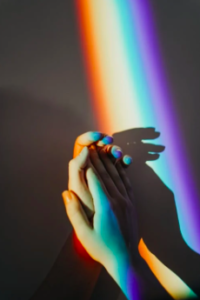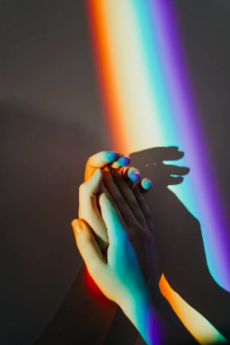 I am Asian American. I am queer. I am a daughter of refugees. I am a Southerner.
I am Asian American. I am queer. I am a daughter of refugees. I am a Southerner.
I was born in San Jose, California. San Jose is located in the Bay Area, a predominantly Asian region. Home to Little Saigon, San Jose contains more Vietnamese people than anywhere else outside of Vietnam. My mom and her family, originally from Saigon, Vietnam, relocated to the Bay Area in the early 1980s after the Vietnam War deprived them of a home. My father, also from Saigon, stayed for another decade after the war ended. Then, he moved to North Carolina where his extended family was already located. In his twenties, he relocated yet again to California, a place that was filled with many up-and-coming Asians. There, he met my mom.
I spent the first five years of my life in the Bay Area. Everyone around me looked alike. While I was shielded from this white supremacist state in my earliest years, I still knew I was Asian before I could know the term Asian American. As ethnic-Chinese people from Vietnam, both of my parents are fluent in Cantonese, a Southeastern Chinese dialect, and were also immersed in Chinese culture alongside their Vietnamese home. Growing up, I knew that my parents spoke to me in Cantonese; I ate Chinese and Vietnamese food; I went to a Vietnamese temple. I was still aware of my Asian status very early on despite not knowing the title of it.
At five years old, I moved to Cary, North Carolina where I resented my Asianness for the first time. Although Cary has become exponentially more diverse in recent years, that was not the case almost fourteen years ago. I was the only Asian kid in my first kindergarten class. When I transferred schools halfway through the year, I was one of four Asian kids in my class of twenty. Suddenly, I wished my features were lighter and my parents would speak more English.
Many Asian American kids can relate to these feelings of isolation and resentment. A common stereotype is that all the Asian kids are friends with each other. For me, this stereotype has risen true time over time. There is no need to justify your being because they just get it. It’s easier to just exist.
Having a group of Asian friends was a game changer. I fell in love with my culture again.
But it’s only the surface culture — foods, holidays, languages, festivals — that I blindly adore. As I grew older, I could no longer bat an eye towards the deep culture and burdens that come with being an Asian American woman. A prominent part of Asian culture is serving your family’s needs over yours. There is a huge emphasis on a collective bond amongst Asian cultures. At times, I’m grateful because it’s a lot more welcoming and comforting than America’s isolating, individualistic lifestyle. However, I’ll not prioritize my family over my own happiness.
I’m expected to choose a field that my parents approve of — one that is STEM-focused and will make me a lot of money. I’m expected to have a husband that my parents approve of — a smart, rich Asian male. I’m expected to produce Asian children like a machine. I’m expected to take in my parents when they’re old and repay them for keeping me alive as a child.
If I express disinterest in any of the above, I’m labeled as selfish and useless for not honoring my parents’ sacrifices to get me to where I am today. I am a humanities major. I want to marry a woman one day. I don’t want biological children. The life that I wish to live betrays my family. But I know that my parents left their homeland to provide me freedom, which includes the freedom to choose the life that I want to live even if it’s not one they understand. That keeps me going.
Last summer, I started to question my sexuality. I came out as bisexual shortly after my 18th birthday. I always assumed that coming out was this climatic moment that marked the end of one’s sexuality exploration due to media portrayals. I quickly learned that is far from the truth. Since coming out, I’ve continued to question my sexuality, toy with different labels, and explore with different people. I’ve always loved knowing the answer, but I now know that labels are not the end all be all.
Exploring my sexuality has been a very liberating process that has taught me a lot about myself. Casual sex and dating has also shown me how rampant Asian fetishization is. I have learned how many non-Asian people view my people and culture through a shallow, dehumanizing narrative. I have had to learn the history of fetishization and how that defines me as an Asian woman. Plot twist: It doesn’t define me; I’m still a confident and smart individual regardless of being fetishized. While fetishization and racism have been very serious issues I’ve had to explore recently, I’ve come to the freeing realization that I can enjoy sex with whomever I want, and there is no shame in that. I can enjoy no-strings-attached sex with men and want a more emotional attachment to women.
Exploring this side of me has been kept a secret from my parents. Within Asian culture, sex is very taboo, only a childbearing act meant for married couples. Mental health is treated similarly. Especially as a child of immigrants, I feel like I don’t have the privilege to complain when I have lived an easier life, one without war or poverty. Yet, I have made a commitment to break the generational cycles of abuse and trauma because I have the privilege to focus on mental health, unlike my parents and ancestors whose mission was survival. The first step is seeking help from a professional who can guide me through all of this weight. I’m seeing an Asian therapist now, once again behind my parents’ back. I’ve had to learn to set my own boundaries that offer me security to live a secret life separate from the facade my family approves of.
I struggle everyday to balance my Asianness, Americanness, and queerness. I’m not sure if I will ever find the perfect balance. But that’s the beauty of being both queer and Asian American — not fitting into any world wholly and creating one of your own where you do fit.
This article was submitted anonymously.

There are no comments
Add yours